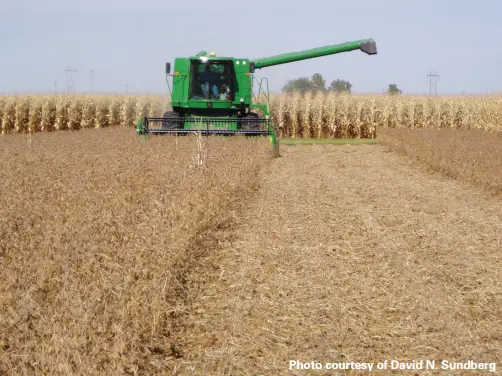According to a recent study conducted by an Iowa State University agronomist, diverse non-genetically modified crop rotation systems can provide a variety of benefits to farmers and perform better than their genetically modified (or GMO for genetically modified organism) crop system counterparts.

Diversified, non-GMO systems were found to have the highest yields by researchers in this Iowa experiment. Photo: The Leopold Center/David N. Sundberg
Research for the study began in 2002 according to this article and was conducted by Matt Liebman, an ISU agronomy professor, using a 22-acre field on ISU’s Marsden Farm for experimental purposes.
GMO, Non-GMO Corn & Soybeans Compared in Study
The study added in a comparison of GMO and non-GMO corn and soybeans in 2008. Six crop rotation and technology system combinations were tested and evaluated from 2008-2012, and a system involving corn, soybeans, oats, and red clover that did not use any GM crops came out as the winner for overall profitability.
In addition, the more diversified three and four-year crop rotation systems with organic additions such as oats and manure produced higher yields of corn and soybeans and were able to keep weeds at bay more effectively than GMO corn-soybean rotation systems.
These systems also used far less synthetic fertilizers and herbicides. Diversifying the crop-growing operations also resulted in better soil quality by several measures.
Currently, many farmers who grow GMO crops do so in mono cultures without rotating to non-GMO crops, which is just one practice that often results in widespread pest problems like in Illinois where rootworms were found to be ravaging GMO corn crops.
The study was funded in part through the Leopold Center for Sustainable Agriculture’s program for competitive grants and can be viewed here.
The Leopold Center has been active in supporting research in Iowa, where GMO corn and soybeans are highly prevalent. In 1998, they funded a Costs and Returns survey that was conducted by the Iowa Agricultural Statistics Service using personal interviews with farmers to study their crop production practices.
Survey Says: GMO Crops “Did Not Influence Profitability”
Surveys of over 350 corn and soy fields each eventually found that the use of GMO crops “did not influence profitability,” and that the use of GMO soybeans resulted in lower yields with lower costs while GMO corn had higher yields with higher costs. In total, returns on GMO and non-GMO crops were virtually identical.
It should also be noted that chemical-resistant weeds and pests have both hurt GMO farmers in recent years since that survey was conducted, reducing yields and forcing farmers to buy more and more chemicals. Many farmers say that yields go up at first but then level off and result in higher costs later as they become stuck on a “chemical treadmill” of sorts.
A 2008 report by the Leopold Center also found that “whole-farm returns to management for the organic farm are higher than the returns to the (GMO) corn-soybean producer,” but organic farmers worked more in the fields.
Thanks for installing the Bottom of every post plugin by Corey Salzano. Contact me if you need custom WordPress plugins or website design.




